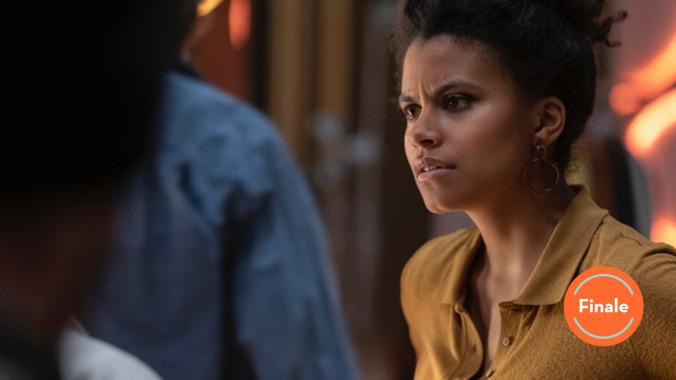The new Twilight Zone ends a mixed first season with a meta episode


One of the biggest mysteries of this first season of The Twilight Zone hasn’t had anything to do with alien invasions or magical objects. Instead, there’s been a bigger question, hanging over the show like a shadow: What’s been the extent of executive producer Jordan Peele’s creative involvement? Peele hostsed every episode, and he’s credited (alongside his other executive producers, Simon Kinberg and Marco Ramirez) with coming up with the story for “Nightmare At 30,000 Feet.” But he doesn’t have any other writing or directing credits, and aside from some similar thematic concerns, there hasn’t been much in this new series so far that’s recalled Peele’s Us and Get Out’s precise combination of feverish nightmare and modern existential ennui.
The season finale, “Blurryman,” comes as close as any episode other than “Replay” at feeling “Peele-esque,” even though it was directed by Kinberg, and written by Alex Rubens (who previously wrote the not-so-good “The Comedian”). Perhaps that’s because the episode’s premise mostly just sets up a long trip into the protagonist’s subconscious, where she’s tormented by images and ideas, not unlike the experience of falling into “the Sunken Place” in Get Out.
Or maybe it’s that Peele appears in this episode as more than just the host.
“Blurryman” begins with a magnificent fake-out—and one that’s perhaps more of a self-own than Rubens and Kinberg mean it to be. The episode opens with Seth Rogen as a writer, struggling to find his way into a post-apocalyptic story, and criticizing every possible path he could take. (“Super-cool creative choice, Chayefsky,” he grumbles at himself.) Then he realizes that he needs to start his end-times scenario with a mushroom cloud, to show the devastation, and to properly set up how this has affected his characters. Having had that breakthrough—and having written it down—he’s excited when his wife (played by Betty Gabriel) walks through the door. She, however, looks haunted. “We need to head to the shelter,” she says. “The reapers will be out soon.” He looks outside the window and sees… rubble and destruction!
Cue Jordan Peele. Except that this time, just when the host is in the middle of his customary spiel about a writer who “never paid much mind to an artist’s social responsibility,” he stops, calls cut, and complains to the writer Sophie (Zazie Beetz) that the narration is “a little too on the nose.” He worries that in framing the episode as an argument against showing the effects of mass-scaled violence, the show would be “saying something we don’t actually want to be saying.”
Peele — or “Peele,” I guess I should say — has a point. Frankly, I was rolling my eyes at his narration before he stepped out of character. But here’s the thing: I was rolling my eyes because this kind of intro is not that unusual for this series. The gag “works” because it’s plausible that a story about a super-powered writer’s social responsibility could be an episode in the new Twilight Zone. (I mean: “The Comedian” is already kind of that.)
This sets up an interesting, highly meta debate between Sophie and the man she familiarly calls “JP.” Sophie suggests that just telling another story about the survivors of a doomsday event isn’t enough, essentially calling this kind of premise “idiotic sci-fi crap.” Peele replies, defensively, “Our show is sci-fi,” to which Sophie says, “But it’s The Twilight Zone… If it’s not saying something, what’s the point?” Peele counters with the argument that there’s nothing wrong with old-fashioned genre creep-outs just for their own sake.
The episode as a whole, meanwhile, suggests that Sophie demanding a larger point for Twilight Zone (even if that was one Serling’s reasons for creating the show in the first place) may be a way of distancing herself from the raw emotions of fear and uncertainty. She says that when she was a kid watching the series, she “always wandered when we were going to get to the Twilight Zone,” confessing that she always read the show’s concept literally. From childhood to now, Sophie doesn’t seem to be much of a fan of ambiguity.
After that opening argument, “Blurryman” seemingly changes focus (no pun intended), becoming about a glitch that a production assistant has spotted in every episode of the show’s first season. It seems that there’s been a blurry figure popping up in the background of multiple scenes. And now that same figure seems to be chasing after Sophie. She walks through empty sets, becoming increasingly paranoid.
I’m sure I wan’t the only who guessed who/what that figure was going to turn out to be. In the final scene, after being haunted by memories of her childhood Twilight Zone fandom, and after being stalked by images from this current season, Sophie meets the Blurryman, and it’s… Rod Serling! Of course it is! This may be an obvious metaphor, but it’s a meaningful one. What haunts the new Twilight Zone writers? What shapeless figure is lurking in the background of every episode? It’s gotta be Serling.
What I most liked about “Blurryman” though isn’t where in ends, but how it gets there. Long stretches of this episode are just scenes of the always excellent Zazie Beetz becoming increasingly freaked out by all manner of unexplained phenomenon. When this Twilight Zone returns for its next season, I’d love to see more of this kind of thing, alongside the social commentary that’s also always been a part of this show. Because I think Peele — or at least the fictional version — is right here. Sometimes you just have to let the nightmare in, and let it do its work.
Stray observations
- Although Young Sophie is seen watching “Time Enough At Last,” the old Twilight Zone episode I thought of most often while watching “Blurryman” was “A Stop At Willoughby,” which is about disappearing into a utopian past that’s like something out of a TV show or movie. There’s a real resonance to the idea that Sophie just wants to live inside of a classic Twilight Zone.
- The debate between Sophie and “JP” about the value of the purely terrifying “campfire story” also reminded me off a recent documentary I watched about the legacy of the controversial children’s book series Scary Stories To Tell In The Dark. I reviewed it here.
- Thanks to you all for reading these reviews this season. I confess I had high hopes for this new Twilight Zone series that weren’t always met, but I enjoyed writing about it anyway, even when I clearly missed the point of an episode. See you on the other side!